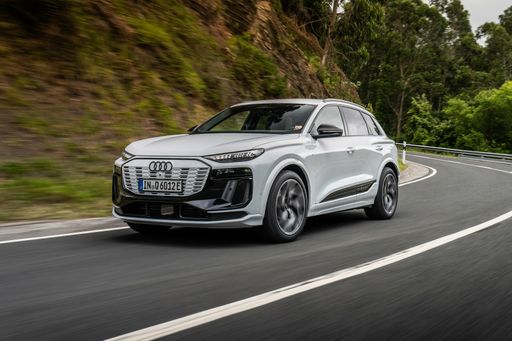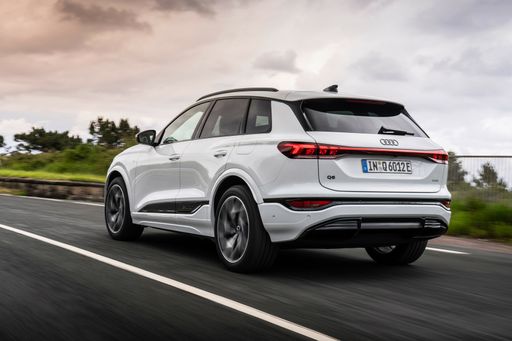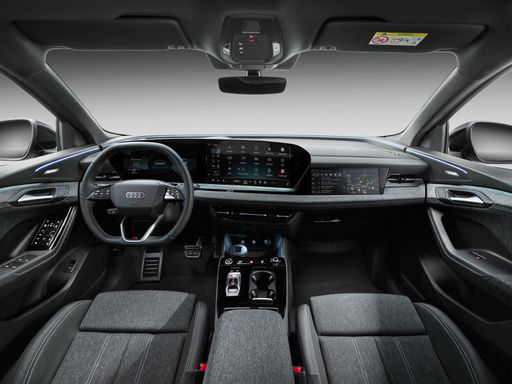Audi Q6 e-tron VS Hyundai Kona
Audi Q6 e-tron
The Audi Q6 e-tron represents a significant step forward in the realm of electric vehicles, offering a perfect blend of cutting-edge technology and timeless design. With its spacious interior and advanced infotainment system, it provides both comfort and connectivity for the modern driver. The Q6 e-tron embodies Audi's commitment to sustainability without compromising on performance or luxury.
more informationHyundai Kona
The Hyundai Kona blends a bold design with a versatile interior, making it a standout choice in the compact SUV market. Its crisp handling and responsive steering provide an engaging driving experience, whether in the city or on the open road. The vehicle also offers a range of features designed to enhance comfort and connectivity, ensuring a pleasurable journey for both driver and passengers.
more information @ audi-mediacenter.com
@ audi-mediacenter.com
 @ audi-mediacenter.com
@ audi-mediacenter.com
 @ audi-mediacenter.com
@ audi-mediacenter.com
 @ hyundai.news
@ hyundai.news
 @ hyundai.news
@ hyundai.news
 @ hyundai.news
@ hyundai.news
 @ hyundai.news
@ hyundai.news
Costs and Consumption |
|
|---|---|
|
Price
about 54400 - 91900
£
|
Price
about 22600 - 41600
£
|
|
Consumption L/100km
-
|
Consumption L/100km
4.5 - 6.7
L
|
|
Consumption kWh/100km
15.6 - 18.9
kWh
|
Consumption kWh/100km
14.6 - 16.8
kWh
|
|
Electric Range
482 - 656
km
|
Electric Range
377 - 514
km
|
|
Battery Capacity
75.8 - 94.9
kWh
|
Battery Capacity
1.3 - 65.4
kWh
|
|
co2
0
g/km
|
co2
128, 103, 141, 152, 0
g/km
|
|
Fuel tank capacity
-
|
Fuel tank capacity
38 - 47
L
|
Dimensions and Body |
|
|
Body Type
SUV
|
Body Type
SUV
|
|
Seats
5
|
Seats
5
|
|
Doors
5
|
Doors
5
|
|
Curb weight
2200 - 2425
kg
|
Curb weight
1370 - 1773
kg
|
|
Trunk capacity
499 - 526
L
|
Trunk capacity
466
L
|
|
Length
4771
mm
|
Length
4350 - 4385
mm
|
|
Width
1939 - 1965
mm
|
Width
1825
mm
|
|
Height
1665 - 1685
mm
|
Height
1580 - 1585
mm
|
|
Payload
540
kg
|
Payload
420 - 490
kg
|
Engine and Performance |
|
|
Engine Type
Electric
|
Engine Type
Petrol, Full Hybrid, Electric
|
|
Transmission
Automatic
|
Transmission
Manuel, Automatic
|
|
Transmission Detail
Reduction Gearbox
|
Transmission Detail
Manual Gearbox, Automat. Schaltgetriebe (Doppelkupplung), Reduction Gearbox
|
|
Drive Type
Rear-Wheel Drive, All-Wheel Drive
|
Drive Type
Front-Wheel Drive, All-Wheel Drive
|
|
Power HP
292 - 516
HP
|
Power HP
100 - 218
HP
|
|
Acceleration 0-100km/h
4.3 - 7
s
|
Acceleration 0-100km/h
7.8 - 13.3
s
|
|
Max Speed
210 - 230
km/h
|
Max Speed
162 - 208
km/h
|
|
Torque
450 - 855
Nm
|
Torque
200 - 265
Nm
|
|
Number of Cylinders
-
|
Number of Cylinders
3 - 4
|
|
Power kW
215 - 380
kW
|
Power kW
74 - 160
kW
|
|
Engine capacity
-
|
Engine capacity
998 - 1598
cm3
|
|
Top speed
210 - 230
km/h
|
Top speed
162 - 208
km/h
|
General |
|
|
Model Year
2024 - 2025
|
Model Year
2024
|
|
CO2 Efficiency Class
A
|
CO2 Efficiency Class
D, C, E, A
|
|
Brand
Audi
|
Brand
Hyundai
|
Audi Q6 e-tron
Introducing the Audi Q6 e-tron: A Step into the Future of Electrification
The Audi Q6 e-tron marks a significant stride forward in the electric vehicle sector, cementing Audi's commitment to innovation and sustainability. This state-of-the-art SUV combines luxury, performance, and cutting-edge technology, catering to the eco-conscious driver without compromising on power or style.
Design Meets Functionality
The Audi Q6 e-tron showcases a sleek design aesthetic common in the Audi lineage. With a length of 4771 mm, it strikes an imposing presence on the road, combining practicality with sophisticated styling. It features a spacious interior that comfortably seats five and offers a generous boot capacity of 514 to 526 litres, making it perfect for both everyday commutes and longer journeys.
Advanced Powertrain Options
The Audi Q6 e-tron comes with a variety of powertrain configurations, reflecting the brand's push towards greater innovation in electric mobility. With a power range between 292 to 516 PS and a torque spread of 450 to 855 Nm, the vehicle promises an engaging driving experience. The electric drivetrain offers two modes of propulsion: rear-wheel drive for more traditional handling and all-wheel drive for enhanced traction under diverse driving conditions.
Efficiency Meets Performance
In terms of efficiency, the Audi Q6 e-tron competes strongly, leveraging advanced battery technology to deliver a range between 482 and 637 kilometres on a single charge, depending on the model. Consumption averages between 16.2 to 18.9 kWh per 100 km, showcasing Audi's commitment to minimal environmental impact. The model's CO2 efficiency class stands at A, highlighting its eco-friendly credentials.
Innovative Technology and Features
The Q6 e-tron is equipped with a host of innovative technologies that enhance both comfort and ultimate control. The vehicle is characterised by Audi’s virtual cockpit, offering intuitive infotainment controls along with a premium sound system. Safety and driver assistance systems are state-of-the-art, incorporating adaptive cruise control, lane assist, and park assist, ensuring peace of mind on every journey.
Acceleration and Speed
A performance enthusiast's dream, the Q6 e-tron accelerates from 0 to 100 km/h in an impressive 4.3 to 7 seconds, contingent on model specification. It boasts a top speed of 210 to 230 km/h, providing the thrilling dynamics typical of Audi's high-performance vehicles.
Electric Vehicle Infrastructure
With varying battery capacities from 75.8 to 94.9 kWh, the Q6 e-tron supports fast charging, making long-distance journeys more feasible than ever before. The advanced energy recuperation system further enhances battery efficiency, maximising range and reducing charging downtime.
A Cost-Effective Investment
The Audi Q6 e-tron presents not just a vehicle but a viable economic investment over the long haul. With a cost structure that spans €63,500 to €104,800, along with monthly running costs ranging from €1,426 to €2,038, it balances premium quality with a sustainable economic footprint.
Conclusion: A New Era of Driving
The Audi Q6 e-tron represents a new chapter in the evolution of electric SUVs, marrying performance with sustainability. As the industry moves toward a greener future, Audi drives forward with innovative design and groundbreaking technology, ensuring that the Q6 e-tron is not just a vehicle but a visionary statement for the future.
Hyundai Kona
The Hyundai Kona: A Comprehensive Overview
The Hyundai Kona has established itself as a standout in the compact SUV segment, blending innovation with performance and style. As the automotive world moves towards more sustainable and efficient options, the Kona offers a variety of powertrains, from traditional petrol engines to full hybrids and all-electric models.
Powertrain Options and Performance
The Hyundai Kona's powertrain choices cater to a wide range of preferences. For petrol enthusiasts, the Kona offers a 1.0L T-GDI engine, delivering 100 PS, and a more robust 1.6L T-GDI variant with up to 170 PS. Those looking for efficiency without sacrificing power can consider the full hybrid model, offering 129 PS and an impressive consumption of 4.5 L/100km.
For a greener option, the all-electric Kona provides a compelling case. With battery capacities of up to 65.4 kWh, the electric Kona offers power outputs of 156 to 218 PS, and efficiencies as low as 14.6 kWh/100km, enabling an electric range of up to 513 km.
Technical Specifications and Innovations
Built on a robust platform, the Kona delivers versatility and reliability. With a choice between manual or dual-clutch automatic gearboxes, along with options for front-wheel or all-wheel drive, the Kona ensures a tailored driving experience. The handling is enhanced by the car's lightweight construction, balancing a 1370 to 1773 kg curb weight with dynamic performance.
The Kona's design doesn't compromise cargo space for style; it offers a generous 466 L boot capacity. With a relatively compact body, measuring 4350 to 4385 mm in length, the Kona easily navigates urban environments while still commanding a strong road presence with its 1825 mm width.
Efficiency and Eco-Friendliness
Hyundai is committed to reducing emissions, as evidenced by the Kona's CO2 efficiency ratings, which range from class A for electric models to class D for some higher-performance petrol variants. The focus on reducing environmental impact without sacrificing driving pleasure is notable throughout the Kona range.
Costing and Value
The Hyundai Kona offers commendable value for money. Pricing starts at €26,400 and reaches up to €50,690, depending on the chosen configuration. The monthly running costs range from €956 to €1090, with a cost per kilometre of 38.3 to 43.6 cents, making it a competitive option in its class.
Conclusion: Modern, Efficient, and Versatile
The Hyundai Kona stands as a testament to Hyundai's commitment to innovation, efficiency, and practicality. Whether you are inclined towards a traditional combustion engine, a hybrid for a balance of power and efficiency, or a full electric model for maximum eco-friendliness, the Kona provides a tailored solution for each unique driver preference.
